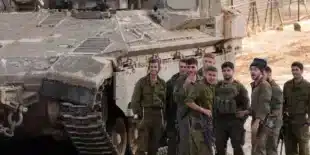Amidst the ongoing conflict in West Asia, particularly the war in Gaza, a senior Iranian official warned that Tehran might revise its nuclear policy if Israel continues to pose a threat to its existence. This statement has sparked new concerns about the potential for nuclear conflict in the region.
Iran’s official stance has been consistently clear: it denies any intention to develop nuclear weapons. However, global intelligence communities have long suspected that Iran aims to acquire nuclear capabilities.
Kamal Kharrazi, an advisor to Iran’s Supreme Leader Ayatollah Ali Khamenei, made a stern warning towards Israel, suggesting that Iran could alter its nuclear doctrine more quickly than previously anticipated. Speaking to Iran’s Student News Network, Kharrazi expressed, “We have no decision to build a nuclear bomb, but should Iran’s existence be threatened, there will be no choice but to change our military doctrine.”
He further elaborated that military officials have indicated the possibility of revising Iran’s nuclear policies if Israel were to attack its nuclear facilities, deviating from prior commitments.
Kharrazi previously mentioned in 2022 that Iran has the technical ability to produce a nuclear bomb, though a decision to proceed with such plans had not been made.
It is noteworthy that Ayatollah Khamenei had issued a fatwa in the early 2000s against the development of nuclear weapons, reinforcing Iran’s public stance against nuclear armament.
Kharrazi underscored the potential shift in Iran’s defensive strategy, stating, “In the case of an attack on our nuclear facilities by the Zionist regime, our deterrence will change.”
The longstanding animosity between Iran and Israel, which Tehran refuses to officially recognize, escalated into direct conflict recently. Last month, Iran launched numerous missiles and drones at Israel, retaliating against what it claimed was an Israeli strike on an Iranian embassy in Damascus, Syria. This marks a significant shift from what had been decades of proxy conflicts to direct confrontation.


